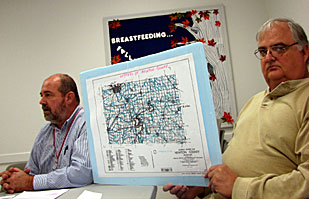
Unsalaried Newton County Health Department Board Member Dale Jobe holds up a chart showing the interrelationship of water resources within the county. He and health department administrator Bob Kulp, pictured left, were presenting information to the media today regarding the importance of voters approving passage of the department's tax levy increase proposal on November 7. Five cents of the proposed seven-cent increase per $100 of property assessment would go towards a refined water program in Newton County that addresses water contamination issues.
While a reminder that the Newton County Health Department hasn't asked the voters for a budget increase since 1948 should have been their main mantra, department officials held a press conference today to give specific reasons for their health tax levy increase on the November 7 ballot. The health department is asking voters to approve an increase of $.07 per $100 of assessed valuation, more than doubling the current levy which stands at $.05 but simply asking for an increase of $10.64 per year from a property owner with a home valued at $80,000.
Admitting that the tax levy only covers one third of the $850,000 operating budget and was not its sole source of funds, department administrator Bob Kulp said that they weren't getting enough money in grants for sustainability of their programs. He emphasized the department's history of fiscal responsibility, giving an example of how they used reserve money about eight years ago to construct the building they now are using without the need for additional taxpayer monies. But the continuation of "slight cutbacks are killing them," he said, calling attention to the need for sufficient tax levy funding.
Shocking statistics released by the department show that 100% of the rivers and streams tested in Newton County for E-Coli bacteria were too high with 72% of all samples at higher than minimum levels for safe body contact. They also found that one third of the water wells tested in the county were contaminated with bacteria.
"Our main purpose is to prevent disease," said Dale Jobe, a more outspoken member of the five serving without compensation on the health department board of trustees. "If disease happens, we think we've failed."
In hoping that voters would take the contamination issues more seriously, Jobe gave, as an example, a couple of county residents who hadn't tested their well until discovering that their newborn baby had "all kinds of stomach problems."
Citing why passage of the levy increase appears to be a hard sell, Jobe said that "people don't like change." Regarding origin of the pollution problems, he said that "everybody wants to blame everybody else," but he concluded that "we need to identify it [the origin] beyond a shadow of a doubt".
Although the department had been using volunteers to collect data from the county's streams, Kulp explained their limitations. He called for the hiring of specialized personnel to utilize a geographical information system for the creation of a data bank and for mapping of sample points throughout the county. In checking fecal samples Kulp also said a DNA library had to be established to determine their exact source.
Without specific data, Jobe explained, at the recent administrative hearings it was easy for Robert Brundage, the lawyer for MoArk, LLC, to question whether water pollution could be attributed to the litter from the chickens that are the basis of his client's operation. DNA testing, Jobe said, would be able to definitively say whether contaminants in the water were from humans, chickens, cattle, or any other livestock.
In answer to the criticism of some members on the Newton County Board of Commissioners that water issues should continue to be handled on the state level, Kulp pointed out that the Missouri Department of Natural Resources does not function at the non-point source pollution level.
Other needs
Two cents of the proposed seven-cent increase per $100 of assessed evaluation is needed to cover other identifiable health needs, including but not limited to increased medical/dental health care for those not able to pay for it. In addition, certain infrastructure upgrades were considered necessary to handle the over 3,000 people per month who utilize the department's services.
Kristy Jones, board of directors chairperson, agreed that it was going to take a lot of collaborative effort to solve the county's problems. In assessing how they cooperate with other health departments, she said, "We don't brag about it enough. A pandemic won't stop at the county line."






Comments